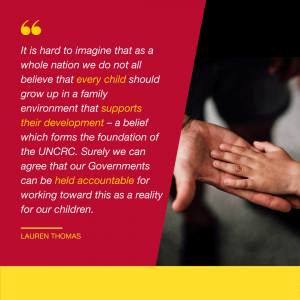
Putting children first in legislation
In a few short months, thirty years will have passed since Australia ratified the United Nations Charter on the Rights of the Child, and here, Lauren Thomas argues that now is the time to finally see a move toward Government accountability. Incorporation of our commitment to these rights into Federal law means that Governments are accountable for their actions towards ensuring they are experienced for all Australian children.
This article was written by Lauren Thomas, Program Manager – Service Development and Projects at the Australian Childhood Foundation.
In December it will be 30 years since Australia ratified the United Nations Charter for the Rights of Children (UNCRC). For thirty years we have agreed – along with almost every other nation in the world now – that these rights exist, and that they are a common standard across the world.
But, in that time, Australia hasn’t yet put these rights into law. Putting rights into law means that Governments are accountable for their commitment to these rights, and for their actions to ensure them. Perhaps it isn’t surprising that our legislation hasn’t yet been updated to incorporate these rights.
But, since last week was Child Protection Week in Australia, and since the theme was ‘Putting Children First’, I thought perhaps it was an ideal time to write and advocate for such a change. Children’s Rights and Child Protection are important as the UNCRC outlines the essential nature of our Child Protective Services.
Earlier this week, our CEO, Dr Joe Tucci wrote in ‘Do we really put children first?’ that 1 in 33 children were actively involved in child protection services between 2018-2019. That, in June 2019, 44,900 children were living away from their family because it was not safe for them to return home. He challenged us all ‘Do we want a sort of complacency that accepts that some children are always going to be damaged by violence?’.
I don’t. I believe that part of the solution to this complacency is moving our commitment to the United Nations Charter on the Rights of Children from signatory state with an ideological commitment, to more robust, legislatively binding state which better benefits children.
I believe that part of the solution to this complacency is moving our commitment to the United Nations Charter on the Rights of Children from signatory state with an ideological commitment, to more robust, legislatively binding state which better benefits children.
Other countries have done this. Last year, whilst conducting research, I visited several who either have done so or were campaigning to see their laws change including Finland, Norway, Ireland and Scotland. Last week, after decades of campaigning by children and young people, the publication of research by academics local and abroad, and the advocacy of experts, Scotland were successful, a new bill was announced to incorporate the UNCRC into Scots Law.
Writing for The Times, Bruce Adamson, the Scottish Children and Young People’s Commissioner, wrote that whilst all children will benefit from this change it is the most disadvantaged who will benefit most, “The UNCRC requires the government to give special attention to disabled children, to care-experienced children and those at risk. It requires all available resources to be used to address poverty and provide services such as mental health support”. Incorporating the charter into law enforces this requirement by holding our Government accountable for seeing these outcomes delivered.
In Australia, our children and young people deserve these same protections.
In Australia, our children and young people deserve these same protections. And, as in Scotland, our disadvantaged children stand to benefit most. Our Aboriginal and Torres Strait Islander children continue to be significantly overrepresented in the criminal justice system and in out-of-home care; the rates of child removal due to protection concerns have risen, not decreased in the last five years.
Further, within our statutory child protection systems, the mechanisms for facilitating meaningful and empowered child participation in the policies and decision-making affecting them are limited. Where they are present, they often rely heavily on individual practitioners to be both informed about children’s rights and passionate about children and young people experiencing them for any meaningful activity to take place.
Despite hosting a range of Royal Commissions into areas of society that impact children and their rights, including those into Family Violence (Victoria), into Institutional Responses to Child Sexual Abuse (National), and that into Juvenile Detention (Northern Territory), the legislations that exist in Australia to protect children and keep them safe have a disparate implementation.
Like many federated countries, in Australia, the onus for ensuring the implementation of the UNCRC in law, policy and practice rest with the federated regions (our states and territories). This has produced an inconsistency of approach and varied commitment to the CRC. There is an identified risk that the duty on the Australian Government to ensure implementation has been diluted in the transfer of responsibility to states and territories (Lundy, Kilkelly, Byrne and King. 2012).
 The Foundation has written before that the divergence in legislation and approaches has compromised our support, care and protection of children. Children living in out-of-home care have different legislative protections and responses depending on their geographical location, and even our data collection methods, terms and definitions can differ, making National data collection challenging at best to report on.
The Foundation has written before that the divergence in legislation and approaches has compromised our support, care and protection of children. Children living in out-of-home care have different legislative protections and responses depending on their geographical location, and even our data collection methods, terms and definitions can differ, making National data collection challenging at best to report on.
Whilst some differences may always exist, it is hard to imagine that as a whole nation we do not all believe that every child should grow up in a family environment that supports their development – a belief which forms the foundation of the UNCRC. Surely we can agree that our Governments can be held accountable for working toward this as a reality for our children.
The UN Committee on the Rights of the Child favours direct and full incorporation as the method of implementation, and have written the recommendation into each of our summary reports. It is my belief that a Federal level of incorporation will be to the benefit of all children, and to those whose job it is to support them. Full, federal incorporation is a huge step toward ‘putting children first’ as a nation.
References
- Tucci, Joe. 07/09/2020. Are we really putting children first? Prosody Blog, The Australian Childhood Foundation. Retrieved here.
- Bruce Adamson. 04/09/2020. Putting children’s rights into law is a special moment. The Times. Retrieved here.
- Laura Lundy, Ursula Kilkelly, Bronagh Byrne and Jason King. 2012. The UN Convention on the Rights of the Child: a study of legal implementation in 12 countries. Retrieved here.

